普通高中课程标准实验教科书 英语选修7 Unit 4 Sharing- Reading
时间:2018-12-29 作者:英语课 分类:高中二年级英语
英语课
Dear Rosemary,
Thanks for your letter, which took a fortnight to arrive. It was wonderful to hear from you. I know you're dying to hear all about my life here, so I've included some photos which will help you picture the places I talk about.
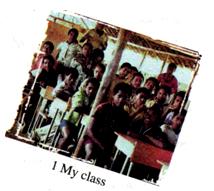
You asked about my high school. Well, it's a bush school – the classrooms are made of bamboo and the roofs of grass. It takes me only a few minutes to walk to school down a muddy track. When I reach the school grounds there are lots of "good mornings" for me from the boys. Many of them have walked a long way, sometimes up to two hours, to get to school.
There's no electricity or water and even no textbooks either! l'm still trying to adapt to these conditions. However, one thing is for sure, I've become more imaginative 1 in my teaching. Science is my most challenging subject as my students have no concept of
doing experiments. In fact there is no equipment, and if I need water I have to carry it from my house in a bucket! The other day I was showing the boys the weekly chemistry experiment when, before I knew it, the mixture was bubbling over everywhere! The boys who had never come across anything like this before started jumping out of the windows. Sometimes I wonder how relevant chemistry is to these students, most of whom will be going back to their villages after Year 8 anyway. To be honest, I doubt whether I'm making any difference to these boys' lives at all.

You asked whether I'm getting to know any local people. Well, that's actually quite difficult as I don't speak much of the local English dialect yet. But last weekend another teacher, Jenny, and 1 did visit a village which is the home of one of the boys, Tombe. It was my first visit to a remote village. We walked for two and a half hours to get there - first up a mountain to a ridge 2 from where we had fantastic views and then down a steep path to the valley below. When we arrived at the village, Tombe's mother, Kiak, who had been pulling weeds in her garden, started crying "ieee ieee". We shook hands with all the villagers. Everyone seemed to be a relative of Tombe's.

Tombe's father, Mukap, led us to his house, a low bamboo hut with grass sticking out of the roof - this shows it is a man's house. The huts were round, not rectangular 3 like the school buildings.
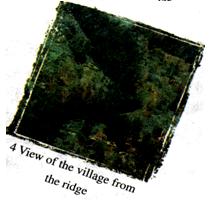
There were no windows and the doorway 4 was just big enough to get through. The hut was dark inside so it took time for our eyes to adjust. Fresh grass had been laid on the floor and there was a newly made platform for Jenny and me to sleep on. Usually Kiak would sleep in her own hut, but that night she was going to share the platform with us. Mukap and Tombe were to sleep on small beds in another part of the hut. There was a fireplace 5 in the centre of the hut near the doorway. The only possessions I could see were one broom, a few tin plates and cups and a couple of jars.
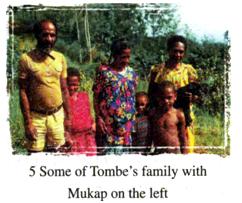
Outside Mukap was building a fire. Once the fire was going, he laid stones on it. When hot, he placed them in an empty oil drum with kau kau (sweet potato), corn and greens. He then covered the vegetables with banana leaves and left them to steam. I sniffed 6 the food; it smelled delicious. We ate inside the hut sitting round the fire. I loved listening to the family softly talking to each other in their language, even though I could not participate the conversation. Luckily, Tombe could be our interpreter.

Later, I noticed a tin can standing 7 upside down on the grill 8 over the fire. After a short time Tombe threw it out of the doorway.I was puzzled. Tombe told me that the can was heated to dry out the leftover 9 food. They believe that any leftovers 10 attract evil spirits in the night, so the food is dried up in the can and the can is then thrown out of the hut. Otherwise they don't waste anything.
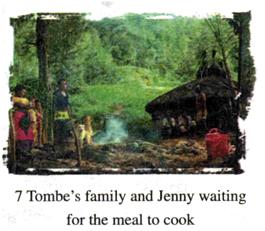
We left the village the next morning after many goodbyes and firm handshakes. My muscles were aching and my knees shaking as we climbed down the mountain towards home. That evening I fell happily into bed. It was such a privilege to have spent a day with Tombe's family.
It's getting late and I have to prepare tomorrow's lessons and do some paperwork. Please write soon.
Love
Jo
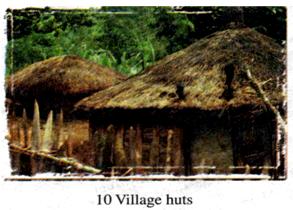

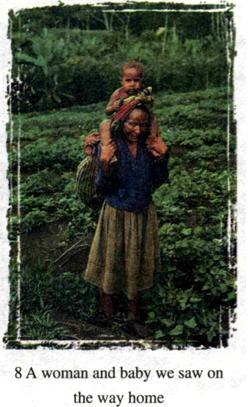
Thanks for your letter, which took a fortnight to arrive. It was wonderful to hear from you. I know you're dying to hear all about my life here, so I've included some photos which will help you picture the places I talk about.

You asked about my high school. Well, it's a bush school – the classrooms are made of bamboo and the roofs of grass. It takes me only a few minutes to walk to school down a muddy track. When I reach the school grounds there are lots of "good mornings" for me from the boys. Many of them have walked a long way, sometimes up to two hours, to get to school.
There's no electricity or water and even no textbooks either! l'm still trying to adapt to these conditions. However, one thing is for sure, I've become more imaginative 1 in my teaching. Science is my most challenging subject as my students have no concept of
doing experiments. In fact there is no equipment, and if I need water I have to carry it from my house in a bucket! The other day I was showing the boys the weekly chemistry experiment when, before I knew it, the mixture was bubbling over everywhere! The boys who had never come across anything like this before started jumping out of the windows. Sometimes I wonder how relevant chemistry is to these students, most of whom will be going back to their villages after Year 8 anyway. To be honest, I doubt whether I'm making any difference to these boys' lives at all.

You asked whether I'm getting to know any local people. Well, that's actually quite difficult as I don't speak much of the local English dialect yet. But last weekend another teacher, Jenny, and 1 did visit a village which is the home of one of the boys, Tombe. It was my first visit to a remote village. We walked for two and a half hours to get there - first up a mountain to a ridge 2 from where we had fantastic views and then down a steep path to the valley below. When we arrived at the village, Tombe's mother, Kiak, who had been pulling weeds in her garden, started crying "ieee ieee". We shook hands with all the villagers. Everyone seemed to be a relative of Tombe's.

Tombe's father, Mukap, led us to his house, a low bamboo hut with grass sticking out of the roof - this shows it is a man's house. The huts were round, not rectangular 3 like the school buildings.

There were no windows and the doorway 4 was just big enough to get through. The hut was dark inside so it took time for our eyes to adjust. Fresh grass had been laid on the floor and there was a newly made platform for Jenny and me to sleep on. Usually Kiak would sleep in her own hut, but that night she was going to share the platform with us. Mukap and Tombe were to sleep on small beds in another part of the hut. There was a fireplace 5 in the centre of the hut near the doorway. The only possessions I could see were one broom, a few tin plates and cups and a couple of jars.

Outside Mukap was building a fire. Once the fire was going, he laid stones on it. When hot, he placed them in an empty oil drum with kau kau (sweet potato), corn and greens. He then covered the vegetables with banana leaves and left them to steam. I sniffed 6 the food; it smelled delicious. We ate inside the hut sitting round the fire. I loved listening to the family softly talking to each other in their language, even though I could not participate the conversation. Luckily, Tombe could be our interpreter.

Later, I noticed a tin can standing 7 upside down on the grill 8 over the fire. After a short time Tombe threw it out of the doorway.I was puzzled. Tombe told me that the can was heated to dry out the leftover 9 food. They believe that any leftovers 10 attract evil spirits in the night, so the food is dried up in the can and the can is then thrown out of the hut. Otherwise they don't waste anything.

We left the village the next morning after many goodbyes and firm handshakes. My muscles were aching and my knees shaking as we climbed down the mountain towards home. That evening I fell happily into bed. It was such a privilege to have spent a day with Tombe's family.
It's getting late and I have to prepare tomorrow's lessons and do some paperwork. Please write soon.
Love
Jo



1 imaginative
adj.富有想象力的,爱想象的
- The imaginative child made up fairy stories.这个想像力丰富的孩子自己编神话故事。
- Scott was an imaginative writer.司格特是位富于想象力的作家。
2 ridge
n.山脊;鼻梁;分水岭
- We clambered up the hillside to the ridge above.我们沿着山坡费力地爬上了山脊。
- The infantry were advancing to attack the ridge.步兵部队正在向前挺进攻打山脊。
3 rectangular
adj.矩形的,成直角的
- He put a rectangular box on the table.他把一个长方形的箱子放在桌子上。
- The equations are written in rectangular coordinates.这些方程是在直角座标系中写出的。
4 doorway
n.门口,(喻)入门;门路,途径
- They huddled in the shop doorway to shelter from the rain.他们挤在商店门口躲雨。
- Mary suddenly appeared in the doorway.玛丽突然出现在门口。
5 fireplace
n.壁炉,炉灶
- The fireplace smokes badly.这壁炉冒烟太多。
- I think we should wall up the fireplace.我想应该封住壁炉。
6 sniffed
v.以鼻吸气,嗅,闻( sniff的过去式和过去分词 );抽鼻子(尤指哭泣、患感冒等时出声地用鼻子吸气);抱怨,不以为然地说
- When Jenney had stopped crying she sniffed and dried her eyes. 珍妮停止了哭泣,吸了吸鼻子,擦干了眼泪。 来自《简明英汉词典》
- The dog sniffed suspiciously at the stranger. 狗疑惑地嗅着那个陌生人。 来自《简明英汉词典》
7 standing
n.持续,地位;adj.永久的,不动的,直立的,不流动的
- After the earthquake only a few houses were left standing.地震过后只有几幢房屋还立着。
- They're standing out against any change in the law.他们坚决反对对法律做任何修改。
8 grill
n.烤架,铁格子,烤肉;v.烧,烤,严加盘问
- Put it under the grill for a minute to brown the top.放在烤架下烤一分钟把上面烤成金黄色。
- I'll grill you some mutton.我来给你烤一些羊肉吃。